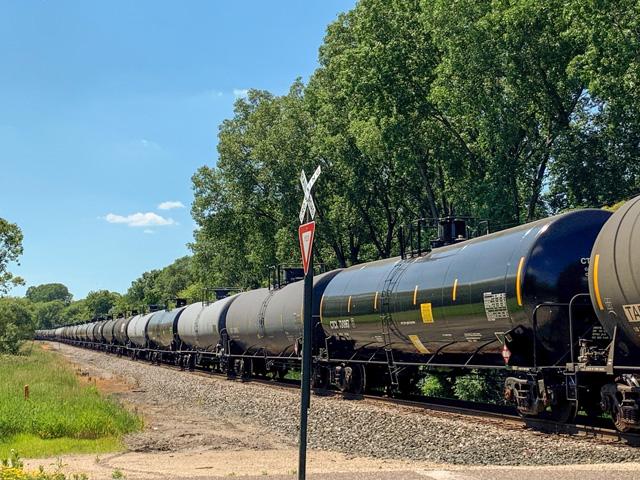Railroad Safety Act Advances
Senate Committee Advances New Safety Requirements for Railroads
MINNEAPOLIS (DTN) -- Citing the February toxic-chemical derailment in Ohio, the U.S. Senate Commerce Committee on Wednesday advanced a bill placing more safety requirements on railroads.
The bill, the Bipartisan Rail Safety Act, would mandate railroads use safety detectors and at more frequent intervals than railroads now use voluntarily. Trains also would be required to slow down in urban areas when hauling hazardous materials and install better braking systems. Further, the bill broadens the list of chemicals that are classified as hazardous.
The bill moved out of committee on a 16-11 vote. Sen. Maria Cantwell, D-Wash., chair of the committee, cited the act was drafted by a bipartisan group of senators from Ohio, Pennsylvania, Florida and Missouri following the Burlington Northern derailment in East Palestine, Ohio, in February.
"No community should have to go through the trauma and evacuation and environmental damage that East Palestine had to go through, especially when you can prevent these from happening," Cantwell said.
Responding to the bill, the Association of American Railroads (AAR) released a statement seeking more changes but stating that the railroad industry wants to improve safety in the process. "The AAR and its member railroads urge policymakers to continue refining the legislation to ensure the bill is focused on solution-driven polices that will measurably enhance safety."
AAR President and CEO Ian Jefferies said "Committee negotiations on the Rail Safety Act have yielded substantive improvements that advance stakeholders' shared goal -- enhancing rail safety, supporting first responders and keeping our communities safe.
P[L1] D[0x0] M[300x250] OOP[F] ADUNIT[] T[]
"Railroads support items of this bill and remain fully committed to working with the Committee and all members of the Senate to build on these improvements, with the ultimate goal of ensuring all provisions result in meaningful data-driven safety advancements that all can support. While the current legislation is less prescriptive than originally considered, conversations must continue to ensure the bill encourages future safety technological advancements."
The bill also would require minimum two-person crews and stronger inspection requirements -- a few of the issues that railroads oppose. The bill would also increase fines on railroads for safety violations from $100,000 to up to $10 million. Labor unions are lobbying lawmakers to keep all of this intact.
Initially, the legislation had provisions to limit the number of rail cars per train, but the bill that passed out of committee now will require the Secretary of Transportation to conduct a study on safety concerns of longer trains and issue its own analysis, then draft a rule on the length of trains. The bill also would require railroads to report the weight tonnages of any train involved in a reportable accident.
The American Short Line and Railroad Association (ASLRRA) said it worked with lawmakers to modify the bill and called the measure as it came out of committee, "meaningful progress towards recognizing the unique needs of smaller freight railroads across the country and mitigates many of the unintended consequences that we were concerned about," said Chuck Baker, president of ASLRRA.
Still, the short lines cited the "interconnected nature of the U.S. freight rail system" to state that the short line railroads are still "apprehensive" about the regulatory impacts they will face.
The unions representing workers were more upbeat about the prospects of the bill.
"Right now our nation's railroads largely self-regulate," said Brotherhood of Locomotive Engineers and Trainmen National President Eddie Hall on the union website after the bill was introduced. "We welcome greater federal oversight and a crackdown on railroads that seem all too willing to trade safety for higher profits."
Hall added, "If the language is not precise, the Class I railroads will avoid the scope of the law without violating the law, yet again putting the safety of our members and American communities into harm's way."
He said, "You can run a freight train through the loopholes. As currently written, the bill would only address operations on long-distance freight trains. The BLET will seek changes to the wording of the two-person crew language to tighten the loopholes."
Details on the bill and amendments as it passed out of committee: https://www.commerce.senate.gov/…
AAR Statement on Senate Commerce Rail Safety Act Vote https://www.aar.org/…
Mary Kennedy can be reached at mary.kennedy@dtn.com
Follow her on Twitter @MaryCKenn
(c) Copyright 2023 DTN, LLC. All rights reserved.



